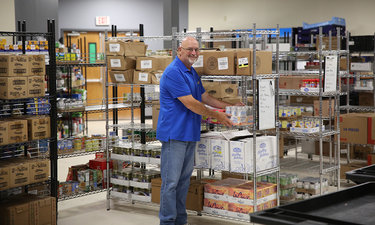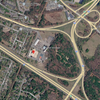Inflation conundrum: More food insecurity, fewer pantry donations
GUILDERLAND — The Guilderland Food Pantry has more than doubled its space — from 1,000 to 2,400 square feet — to accommodate a growing need in the town.
One in nine people in Guilderland is food insecure, according to the pantry’s director, John McDonnell. Use of the pantry took off with the pandemic — and is growing again.
McDonnell became the director in February 2020, a month before the pandemic hit. “I inherited 75 volunteers,” he recalled this week. “That shrunk to 24 with the pandemic.”
Still, he said proudly, “During the entire pandemic, we never shut the doors.”
The volunteers now number around 50 and more are always welcomed, McDonnell told The Enterprise.
He and his volunteers are now in the midst of what he terms “a perfect storm.”
Each month since the COVID-19 shutdown began in March 2020, between 15 and 20 new families were added to the pantry’s client list. By July of 2020, the pantry had 200 families registered as clients.
The number of clients stabilized with the distributed federal funds, McDonnell said. “But the stimulus checks are spent. That money has dried up,” he said this week. “And inflation is at an unprecedented rate.”
That means fewer people are donating, while at the same time more people need food.
From August last year to this past August, pantry use increased 55 percent, McDonnell estimated.
The pantry added 301 families in 2021 and so far this year — two-thirds of the way through 2022 — 334 families have been added.
The number of meals provided by the pantry has gone from 21,636 last year to a projected 36,274 this year.
“I’m not a sociologist,” said McDonnell — after three years serving in the military police, he spent 32 years as a police officer with the Department of Veterans Affairs — but he has noted a dramatic shift in family structure.
The suburban norm of a nuclear two-parent family with a child or two has changed to “extended families coming together,” said McDonnell. Elders have moved in with their children or grown children back in with their parents, he said.
“Grandparents are taking care of their grandkids so parents can work,” he said.
McDonnell, who has lived in Guilderland for most of his life, said a lot of people don’t realize there are pockets of poverty in town. “I talk to seniors every day who are on fixed income and their rent is going up … We have 20 to 25 new families every month. Many of them have never been to a food pantry before.”
Not only are there more pantry customers but another part of the “perfect storm,” said McDonnell, is there is less food to be had. “My biggest challenge is keeping inventory on the shelves,” he said.
Most of the pantry’s food comes from the Regional Food Bank, which in turn gets food through United States Department of Agriculture programs. “The USDA contracts have been cut back,” said McDonnell, citing supply-chain issues.
While the USDA food is free to pantries, the Regional Food Bank also gets salvaged and donated foods from supermarkets for which the Guilderland pantry pays a small fee. The third source is co-op food, which is pricey, said McDonnell.
While he used to have a 20-page computerized shopping list for the Regional Food Bank, McDonnell said, it’s now down to 10 or 11 pages because the food bank simply doesn’t have those products anymore.
Another cause of the perfect storm are trucking issues combined with issues like the avian flu that affected egg and chicken production. “Some days, you can’t find a chicken,” he said.
Sometimes, McDonnell said, he is forced to shop at a commercial store, spending money that comes out of the pantry’s operating budget.
Although there is a state program where farmers donate to the food bank and food pantries at no charge, McDonnell said, “By the time we get it, it’s a couple of days old and we have to distribute it before it goes bad.”
McDonnell is grateful to local businesses, like Gade Farm, that make direct donations.
“I love working with people and helping people,” said McDonnell, who will turn 65 this year.
During his career with Veterans Affairs, he spent 15 years as a crisis trainer and running crisis teams. He found it satisfying “seeing people at their worst, trying to help them get back to their best,” McDonnell said.
He is excited about the new space at the pantry, which is located at Christ’s Church at 4 Charles Blvd. in Guilderland. It allows the pantry to store bulk purchases and accept large donations, McDonnell said, and it provides more room to pull, pack, and distribute food, including for assembling holiday meal packages.
He encourages anyone who is food insecure, anyone who may want to volunteer, or anyone interested in donating to go to the food pantry’s website: guilderlandfoodpantry.com.
Anyone can sign up online to become a pantry client, or they can call at 518-930-1001 or they can come in person, McDonnell said.
“We don’t turn anybody away,” he said.
McDonnell explained that Guilderland’s is a “client-choice pantry,” meaning “we don’t pre-pack food.” Rather, clients choose from a list of what is available so they get the food they want.
The pantry provides standard canned goods, meat choices, dairy products, and food to meet special dietary needs such as gluten-free or low salt foods.
Since the pandemic, clients don’t shop in the building. Rather, they go through their list with a volunteer and then the food is brought to them.
The Guilderland pantry also makes home deliveries six days a week — every day but Sunday. Forty percent of its clients have their food delivered.
“We have a lot of seniors that don’t drive, and people in trailer parks without cars, and single moms with three or four kids,” said McDonnell, explaining the high need for deliveries.
One of the programs he is proudest of is the backpack program in which the pantry works with Guilderland’s five elementary schools and middle school, getting names from counselors of kids that might not have enough to eat over the weekends.
Sixteen percent of the students in the Guilderland school district qualify for free or reduced-price lunches, said McDonnell. Last year, 65 students were part of the backpack program, taking home food on Fridays, in backpacks, that the pantry delivers to the schools. McDonnell said it costs $350 per year for each of those children to get the weekend food.
A ribbon-cutting ceremony is scheduled for Thursday, Sept. 8, to celebrate the new space, which McDonnell hopes will “increase awareness about who we are, what we do, and how you can help.”
He went on, “with money tight for everybody, food and money donations are down.”
McDonnell said, though, that he is encouraged by neighborhood effords and spoke of two kids who ran a lemonade stand and donated their proceeds to the pantry.
“Every can of beans helps …,” McDonnell said. “Awareness is what it’s all about.”



